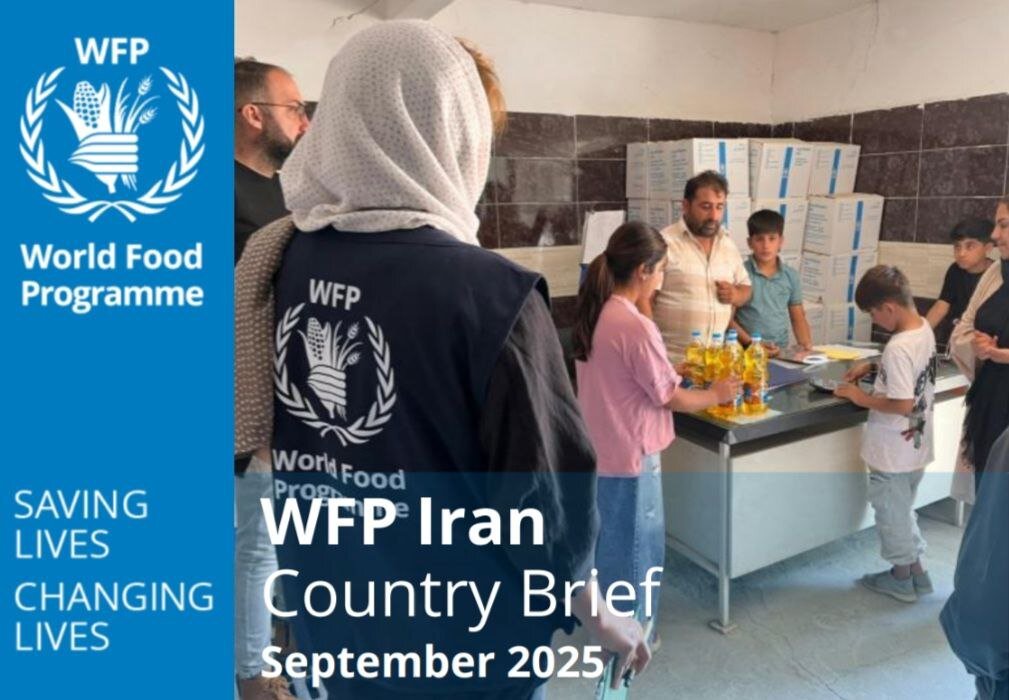WFP releases September report on Iran

TEHRAN – The World Food Program (WFP) has released a report, expounding on activities in Iran over the month of September.
In September, WFP food assistance reached 33,107 beneficiaries, which included Afghan and Iraqi refugees as well as Iranian teachers. Refugees are assisted with a staple food basket, which includes fortified wheat flour (12 kg per person per month) and vegetable oil (810 ml per person per month).
Under cash-based transfers, following the revision of WFP’s Minimum Expenditure Basket (MEB) conducted in November 2024, the Centre for Aliens and Foreign Immigrants Affairs (CAFIA) confirmed adjustments to cash transfer values starting in January.
In September, WFP continued to provide the increased cash transfers to better support essential living costs. The transfer is IRR 5 million (USD 7.2) for households headed by men and IRR 6 million (USD 8.6) for households headed by women.
WFP Iran’s school-based programs, including school feeding and educational incentives, have been temporarily suspended due to the summer holidays and will resume with the start of the new academic year in October.
By September, WFP Iran helped ease the financial burden associated with the gluten-free dietary needs of 53 refugee celiac patients from WFP’s beneficiaries by providing them with an extra cash amount of IRR 9.7 million (US$14.13) per person as a replacement for their usual food entitlement.
WFP supported 399 refugees with disabilities in September across ten settlements, each receiving an additional monthly cash support of IRR 3 million (US$4.3), on top of their regular aid. Initially launched in two provinces, the initiative was gradually expanded to cover settlements in Saveh, Semnan, Bani Najar, Sarvestan, Bezileh, Abazar, Rafsanjan, Bardsir, Jahrom, Meybod, and Torbat-e-jam.
To enhance the economic resilience and self-sufficiency of 310 refugees (42 percent women) in September, WFP continued its support for 25 income-generating initiatives across 18 settlements. Activities included welding, tailoring, baking, and farming, among others.
To strengthen food security, WFP delivered two fully equipped bakery units to the Bardsir and Rafsanjan settlements in Kerman Province, providing 11,000 residents with reliable access to fresh, high-quality bread.
Nearly 35,000 registered refugees in designated settlements reside in largely protected areas. Supported by WFP, United Nations High Commissioner for Refugees (UNHCR), and other agencies, these communities receive regular assistance and are closely coordinated with humanitarian actors. However, they remain heavily dependent on external support for food, health care, and education, making sustained aid essential to their stability.
In 2024, WFP provided a combination of in-kind and cash assistance to address the food needs of over 33,000 vulnerable refugees in Iran. As a result, 70 percent of them were able to consume food at an acceptable level, a figure that remains nearly stable compared to the previous year.
Since August, WFP has successfully increased the value of the cash transfer entitlement by 25 percent, actively helping to mitigate the immediate economic challenges reported by refugees.
WFP has maintained a presence in Iran since 1987, primarily focused on addressing the food security needs of refugees, mainly from Afghanistan. Iran has hosted refugees for over four decades. Most refugees, along with those in refugee-like conditions, reside in urban, peri-urban, and rural areas, often integrated with host communities. However, the most vulnerable refugees living in 20 settlements across 13 provinces face a precarious food security situation that necessitates continued humanitarian assistance by the WFP.
WFP provided food assistance, educational support, and livelihood opportunities through in-kind food distributions, unconditional cash transfers, and capacity-strengthening initiatives to eligible refugees who live in settlements.
Given the economic situation in Iran in recent years, Afghan refugees have also faced many challenges, including reduced income opportunities and diminished purchasing power, which have impacted their food security and well-being, particularly among those in settlements. In response, WFP adjusted its Interim Country Strategic Plan (ICSP 2023-2027) to align with the need by modifying cash entitlements and food rations, adjusting the number of beneficiaries, and extending the duration of the ICSP by two years to align with the United Nations Sustainable Development Framework (UNSDF 2023-2027), ensuring uninterrupted assistance.
WFP implemented activities under the ICSP to sustain its support to these refugees and address their increasing humanitarian needs. There are around 35,000 most vulnerable documented refugees who live in 20 settlements across 13 provinces in Iran and are benefiting from WFP-provided food assistance.
MT/MG
Leave a Comment